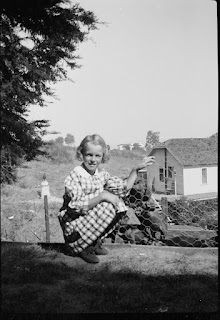When I first had the idea to do a series of Notable Californians to help me get better acquainted with my new home state, I had no idea Norma Jeane Mortenson, Norma Jean Baker, Marilyn Monroe was a born and raised Angeleno. I, for some reason, thought she was of the typical "girl from the Midwest dreams of Hollywood" trope. Her life was so incredibly complicated, I may have to do this post in several segments.
The Early Years
Marilyn Monroe was born as Norma Jeane Mortenson on June 1, 1926 at the Los Angeles County Hospital in Los Angeles, California. Her mother, Gladys Pearl Baker (née Monroe) was from a poor Midwestern family who had migrated to California at the turn of the century. At the age of 15, Gladys married John Newton Baker, an abusive man nine years her senior. They had two children named Robert (1917–1933) and Berniece (1919–2014). She successfully filed for divorce and sole custody in 1923, but Baker kidnapped the children soon after and moved with them to his native Kentucky.
Monroe was not told that she had a sister until she was 12 and met Berniece for the first time as an adult. Following the divorce, Gladys worked as a film negative cutter at Consolidated Film Industries. In 1924, she married Martin Edward Mortensen, but they separated only some months later and divorced in 1928. In 2022, DNA testing indicated that Monroe's father was Charles Stanley Gifford, Gladys’ co-worker with whom she had an affair in 1925.
Although Gladys was mentally and financially unprepared for a child, Monroe's early childhood was stable and happy. Gladys placed her daughter with evangelical Christian foster parents Albert and Ida Bolender in the rural town of Hawthorne. She also lived there for the first six months, until she was forced to move back to the city due to work. She then began visiting her daughter on weekends. In the summer of 1933, Gladys bought a small house in Hollywood with a loan from the Home Owners' Loan Corporation and moved seven-year-old Monroe in with her.
They shared the house with lodgers, actors George and Maude Atkinson and their daughter, Nellie. In January 1934, Gladys had a mental breakdown and was diagnosed with paranoid schizophrenia. After several months in a rest home, she was committed to the Metropolitan State Hospital. She spent the rest of her life in and out of hospitals and was rarely in contact with Monroe. Monroe became a ward of the state, and her mother's friend, Grace Goddard, took responsibility over her and her mother's affairs.
Over the next four years, Monroe's living situation changed often. For the first 16 months, she continued living with the Atkinsons, and may have been sexually abused during this time. Always a shy girl, she now also developed a stutter and became withdrawn. In the summer of 1935, she briefly stayed with Grace and her husband Erwin "Doc" Goddard and two other families. In September 1935, Grace placed her in the Los Angeles Orphans Home. The orphanage was "a model institution" and was described in positive terms by her peers, but Monroe felt abandoned.
Encouraged by the orphanage staff who thought that Monroe would be happier living in a family, Grace became her legal guardian in 1936, but did not take her out of the orphanage until the summer of 1937. Monroe's second stay with the Goddards lasted only a few months because Doc molested her. She then lived brief periods with her relatives and Grace's friends and relatives in Los Angeles and Compton.
It was Monroe's childhood experiences that first made her want to become an actor: "I didn't like the world around me because it was kind of grim ...When I heard that this was acting, I said that's what I want to be ... Some of my foster families used to send me to the movies to get me out of the house and there I'd sit all day and way into the night. Up in front, there with the screen so big, a little kid all alone, and I loved it."
Monroe found a more permanent home in September 1938, when she began living with Grace's aunt, Ana Lower, in Sawtelle. She was enrolled in Emerson Junior High School and went to weekly Christian Science services with Lower. Monroe was otherwise a mediocre student, but excelled in writing and contributed to the school newspaper. Due to the elderly Lower's health problems, Monroe returned to live with the Goddards in Van Nuys in around early 1941.
The same year, she began attending Van Nuys High School. In 1942, the company that employed Doc Goddard relocated him to West Virginia. California child protection laws prevented the Goddards from taking Monroe out of state, and she faced having to return to the orphanage. As a solution, she married their neighbors' 21-year-old son, factory worker James Dougherty, on June 19, 1942, just after her 16th birthday. Monroe subsequently dropped out of high school and became a housewife. She found herself and Dougherty mismatched and later stated that she was "dying of boredom" during the marriage. In 1943, Dougherty enlisted in the Merchant Marine and was stationed on Santa Catalina Island, where Monroe moved with him.
Photographer after photographer attests to her professionalism. More than any other model they worked with, Norma Jean was relentlessly self-critical; she scrutinized contact sheets and negatives for the tiniest fault; she asked her photographers for advice. According to biographer Donald Spoto, she wanted “every image of herself to be brilliant."
Her mother-in-law. Ethel Dougherty, did not approve of this new career, so Norma Jean moved out of the house they were sharing. She joined the Village School, a modeling agency in Westwood, and by the spring of 1946 her hard work had landed her on the cover of thirty-three magazines, including U.S. Camera, Parade, and Glamorous Models.
The agency deemed Monroe's figure more suitable for pin-up than high fashion modeling, and she was featured mostly in advertisements and men's magazines. To make herself more employable, she straightened her hair and dyed it blonde. According to Emmeline Snively, the agency's owner, Monroe quickly became one of its most ambitious and hard-working models; by early 1946, she had appeared on 33 magazine covers for publications such as Pageant, U.S. Camera, Laff, and Peek. As a model, Monroe occasionally used the pseudonym Jean Norman.
Through Snively, Monroe signed a contract with an acting agency in June 1946. After an unsuccessful interview at Paramount Pictures, she was given a screen-test by Ben Lyon, a 20th Century-Fox executive. Head executive Darryl F. Zanuck was unenthusiastic about it, but he gave her a standard six-month contract to avoid her being signed by rival studio RKO Pictures. Monroe's contract began in August 1946, and she and Lyon selected the stage name "Marilyn Monroe". The first name was picked by Lyon, who was reminded of Broadway star Marilyn Miller; the last was Monroe's mother's maiden name.
An unmarried woman was more favorably regarded in this system, pregnancy during filming could be very troublesome, so she quietly slipped over to Las Vegas to get a divorce from Jim in September 1946. According to Gloria Steinem in Marilyn, Norma Jean was determined and ambitious, and she was not going to let her arranged marriage to Jim, who didn’t support her career choice anyway, keep her from being successful in her chosen profession.
To be Continued . . .









No comments:
Post a Comment